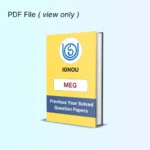IGNOU MEG-08 Block 1 Summary | Introduction
- Last Updated On October 14, 2025
Table of Contents
Here you will get the detailed summary of IGNOU MEG 08 Block 1 – Introduction.
We have provided the summary of all units starting from unit 1 to unit 6.
Introduction
Block 1 of MEG-8, titled Introduction, sets the stage for understanding the diverse and evolving field of postcolonial literatures. It introduces the terminology, contexts, and critical debates surrounding literary works from Africa, the Caribbean, South Asia, Australia, and Canada. Each unit offers a regional perspective while addressing broader themes such as identity, resistance, nationalism, diaspora, and cultural hybridity. The block highlights that postcolonial literature is not monolithic; instead, it reflects multiple histories, voices, and aesthetic strategies.
Unit 1 – Naming the Discipline
This unit discusses the terminological and theoretical framework of postcolonial studies. It explores what it means to call a body of work “postcolonial” and the implications of such a term.
Key Concepts:
-
Postcolonial: Refers to both the historical period after colonialism and the critique of colonial power in literature and theory.
-
Debates about the term:
-
Is “postcolonial” adequate to describe diverse literatures from different regions?
-
Does it suggest that colonialism is entirely past?
-
-
Related Terms:
-
Third World literature, Commonwealth literature, world literature.
-
-
Critique of Eurocentrism: Postcolonial theory challenges the dominance of Western literary standards.
-
Major theorists: Edward Said (Orientalism), Homi Bhabha, Gayatri Spivak.
This unit lays the foundation for students to critically engage with the ideological assumptions behind literary classification and canon formation.
Unit 2 – African Literature: Culture and Post-Nationalist Politics in Kenya and Nigeria
This unit focuses on African literature, particularly from Kenya and Nigeria, as a site of cultural resistance and political engagement in the post-independence period.
Themes Explored:
-
Language Debate:
-
Should African writers write in colonial languages (English/French) or native ones (Swahili, Igbo)?
-
Ngũgĩ wa Thiong’o advocates for writing in indigenous languages to reclaim cultural identity.
-
-
Post-nationalist concerns:
-
Disillusionment with post-independence leaders.
-
Exploration of corruption, neocolonialism, and class divisions.
-
-
Cultural recovery and oral traditions:
-
African literature often incorporates oral storytelling, proverbs, and traditional values.
-
This unit illustrates how African writers use literature to critique postcolonial failures and to reconstruct national and cultural identities.
Unit 3 – Caribbean Literature: The Aesthetic of Diaspora
This unit explores Caribbean literature through the lens of diaspora, displacement, and cultural hybridity. The Caribbean region has a complex history of slavery, colonization, and migration, which deeply influences its literature.
Key Points:
-
Diasporic identity: Themes of fragmentation, exile, and memory dominate Caribbean texts.
-
Creolization: A linguistic and cultural blending that reflects the region’s plural identities.
-
Resistance and survival:
-
Literature often resists colonial narratives and celebrates Afro-Caribbean heritage.
-
-
Influential writers: Derek Walcott, Jean Rhys, V.S. Naipaul.
-
Stylistic experimentation: Use of patois, folklore, and non-linear narratives to represent lived experience.
The unit emphasizes that Caribbean literature articulates a diasporic consciousness shaped by multiple displacements and cultural negotiations.
Unit 4 – South Asian Literature
This unit examines literature from South Asia, including India, Pakistan, Bangladesh, and Sri Lanka, focusing on partition, postcolonial nationalism, and identity politics.
Major Themes:
-
Partition and trauma: The 1947 Partition of India led to massive displacement, which remains a central literary theme.
-
Gender and nation: Women’s bodies often become symbols in nationalistic discourses.
-
Cultural hybridity: Writers reflect on belonging, alienation, and negotiating tradition with modernity.
-
Postcolonial urbanism: Cities like Delhi, Mumbai, and Karachi become metaphors for change and chaos.
-
English as literary medium:
-
Debates around authenticity, elitism, and accessibility.
-
Writers like Salman Rushdie, Arundhati Roy, and Amitav Ghosh use English to tell complex regional stories.
-
This unit underscores the tensions between the colonial past and contemporary realities in South Asian literature.
Unit 5 – Australian Literature: Interrogating National Myths
Australian literature is explored here as a means of questioning national myths, particularly those related to settler colonialism and Indigenous erasure.
Focus Areas:
-
Myth of the ‘bush’: Early Australian literature romanticized the outback, often ignoring Indigenous presence.
-
Aboriginal voices:
-
Increasing recognition of Indigenous writers and their narratives of survival, loss, and land rights.
-
-
Multiculturalism:
-
Modern Australian literature reflects immigrant experiences and challenges white national identity.
-
-
Postcolonial re-readings: Writers re-examine Australia’s colonial history and its contemporary implications.
This unit highlights how literature is used to critique foundational myths and advocate for inclusivity and historical reckoning.
Unit 6 – Canadian Literature: Scanning the Literary Landscape
This unit surveys Canadian literature, emphasizing themes of wilderness, identity, bilingualism, and the complex relationship with both British and American cultures.
Main Themes:
-
Survival and landscape: Nature is often portrayed as both majestic and threatening.
-
Cultural duality:
-
English and French literary traditions coexist, sometimes in tension.
-
-
Postcolonial concerns:
-
Like Australia, Canada grapples with Indigenous history and land rights.
-
-
Immigrant narratives:
-
A growing body of literature from diasporic writers addressing race, migration, and hybrid identity.
-
-
Key authors: Margaret Atwood, Alice Munro, Michael Ondaatje.
The unit presents Canadian literature as a site of negotiation between tradition and diversity, between history and modern multicultural realities.
